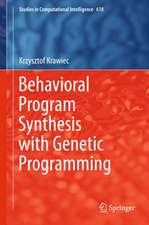Engineering Evolutionary Intelligent Systems: Studies in Computational Intelligence, cartea 82
Editat de Ajith Abraham, Crina Grosan, Witold Pedryczen Limba Engleză Paperback – 17 noi 2010
| Toate formatele și edițiile | Preț | Express |
|---|---|---|
| Paperback (1) | 995.42 lei 6-8 săpt. | |
| Springer Berlin, Heidelberg – 17 noi 2010 | 995.42 lei 6-8 săpt. | |
| Hardback (1) | 999.35 lei 6-8 săpt. | |
| Springer Berlin, Heidelberg – 3 ian 2008 | 999.35 lei 6-8 săpt. |
Din seria Studies in Computational Intelligence
- 20%
 Preț: 449.37 lei
Preț: 449.37 lei - 20%
 Preț: 1158.26 lei
Preț: 1158.26 lei - 20%
 Preț: 986.66 lei
Preț: 986.66 lei - 20%
 Preț: 1452.76 lei
Preț: 1452.76 lei - 20%
 Preț: 168.78 lei
Preț: 168.78 lei - 20%
 Preț: 1291.10 lei
Preț: 1291.10 lei - 18%
 Preț: 1112.30 lei
Preț: 1112.30 lei - 20%
 Preț: 565.39 lei
Preț: 565.39 lei - 20%
 Preț: 649.28 lei
Preț: 649.28 lei - 20%
 Preț: 1047.73 lei
Preț: 1047.73 lei - 20%
 Preț: 1578.96 lei
Preț: 1578.96 lei - 20%
 Preț: 643.50 lei
Preț: 643.50 lei - 20%
 Preț: 657.49 lei
Preț: 657.49 lei - 20%
 Preț: 993.28 lei
Preț: 993.28 lei - 20%
 Preț: 990.80 lei
Preț: 990.80 lei - 20%
 Preț: 989.96 lei
Preț: 989.96 lei - 20%
 Preț: 1165.69 lei
Preț: 1165.69 lei - 20%
 Preț: 1444.52 lei
Preț: 1444.52 lei - 20%
 Preț: 1041.96 lei
Preț: 1041.96 lei - 20%
 Preț: 1047.73 lei
Preț: 1047.73 lei - 20%
 Preț: 1046.06 lei
Preț: 1046.06 lei - 18%
 Preț: 2500.50 lei
Preț: 2500.50 lei - 20%
 Preț: 989.13 lei
Preț: 989.13 lei - 20%
 Preț: 1165.69 lei
Preț: 1165.69 lei - 20%
 Preț: 1164.05 lei
Preț: 1164.05 lei - 20%
 Preț: 1042.79 lei
Preț: 1042.79 lei - 20%
 Preț: 1460.19 lei
Preț: 1460.19 lei - 18%
 Preț: 1403.52 lei
Preț: 1403.52 lei - 18%
 Preț: 1124.92 lei
Preț: 1124.92 lei - 20%
 Preț: 1039.47 lei
Preț: 1039.47 lei - 20%
 Preț: 1008.11 lei
Preț: 1008.11 lei - 20%
 Preț: 1045.25 lei
Preț: 1045.25 lei - 20%
 Preț: 1275.42 lei
Preț: 1275.42 lei - 20%
 Preț: 1040.32 lei
Preț: 1040.32 lei - 20%
 Preț: 988.32 lei
Preț: 988.32 lei - 20%
 Preț: 1169.79 lei
Preț: 1169.79 lei - 20%
 Preț: 1162.37 lei
Preț: 1162.37 lei - 20%
 Preț: 1059.26 lei
Preț: 1059.26 lei - 20%
 Preț: 1164.05 lei
Preț: 1164.05 lei - 20%
 Preț: 1166.52 lei
Preț: 1166.52 lei - 20%
 Preț: 1459.38 lei
Preț: 1459.38 lei - 18%
 Preț: 1005.74 lei
Preț: 1005.74 lei - 20%
 Preț: 997.38 lei
Preț: 997.38 lei - 20%
 Preț: 1055.94 lei
Preț: 1055.94 lei - 20%
 Preț: 1284.47 lei
Preț: 1284.47 lei - 20%
 Preț: 994.08 lei
Preț: 994.08 lei - 20%
 Preț: 1048.72 lei
Preț: 1048.72 lei - 20%
 Preț: 1066.02 lei
Preț: 1066.02 lei - 20%
 Preț: 943.78 lei
Preț: 943.78 lei - 20%
 Preț: 1173.10 lei
Preț: 1173.10 lei
Preț: 995.42 lei
Preț vechi: 1244.27 lei
-20% Nou
Puncte Express: 1493
Preț estimativ în valută:
190.50€ • 206.85$ • 160.02£
190.50€ • 206.85$ • 160.02£
Carte tipărită la comandă
Livrare economică 22 aprilie-06 mai
Preluare comenzi: 021 569.72.76
Specificații
ISBN-13: 9783642094668
ISBN-10: 364209466X
Pagini: 464
Ilustrații: XX, 444 p. 191 illus.
Dimensiuni: 155 x 235 x 24 mm
Greutate: 0.65 kg
Ediția:Softcover reprint of hardcover 1st ed. 2008
Editura: Springer Berlin, Heidelberg
Colecția Springer
Seria Studies in Computational Intelligence
Locul publicării:Berlin, Heidelberg, Germany
ISBN-10: 364209466X
Pagini: 464
Ilustrații: XX, 444 p. 191 illus.
Dimensiuni: 155 x 235 x 24 mm
Greutate: 0.65 kg
Ediția:Softcover reprint of hardcover 1st ed. 2008
Editura: Springer Berlin, Heidelberg
Colecția Springer
Seria Studies in Computational Intelligence
Locul publicării:Berlin, Heidelberg, Germany
Public țintă
ResearchCuprins
Engineering Evolutionary Intelligent Systems: Methodologies, Architectures and Reviews.- Genetically Optimized Hybrid Fuzzy Neural Networks: Analysis and Design of Rule-based Multi-layer Perceptron Architectures.- Genetically Optimized Self-organizing Neural Networks Based on Polynomial and Fuzzy Polynomial Neurons: Analysis and Design.- Evolution of Inductive Self-organizing Networks.- Recursive Pattern based Hybrid Supervised Training.- Enhancing Recursive Supervised Learning Using Clustering and Combinatorial Optimization (RSL-CC).- Evolutionary Approaches to Rule Extraction from Neural Networks.- Cluster-wise Design of Takagi and Sugeno Approach of Fuzzy Logic Controller.- Evolutionary Fuzzy Modelling for Drug Resistant HIV-1 Treatment Optimization.- A New Genetic Approach for Neural Network Design.- A Grammatical Genetic Programming Representation for Radial Basis Function Networks.- A Neural-Genetic Technique for Coastal Engineering: Determining Wave-induced Seabed Liquefaction Depth.- On the Design of Large-scale Cellular Mobile Networks Using Multi-population Memetic Algorithms.- A Hybrid Cellular Genetic Algorithm for the Capacitated Vehicle Routing Problem.- Particle Swarm Optimization with Mutation for High Dimensional Problems.
Recenzii
From the reviews:
"The purpose of this book … is to describe the variety of architectures and applications currently being used in evolutionary computation. Evolutionary computation has become an important and frequently used technique for problems in science, engineering, economics, medicine, business, commerce, and the like. … This book could be a useful exposé of how worldwide researchers (outside of the US) are developing new combinations of algorithms … . Summing Up: Recommended. Researchers, faculty, and professionals." (S. E. Haupt, CHOICE, Vol. 46 (01), September, 2008)
"The purpose of this book … is to describe the variety of architectures and applications currently being used in evolutionary computation. Evolutionary computation has become an important and frequently used technique for problems in science, engineering, economics, medicine, business, commerce, and the like. … This book could be a useful exposé of how worldwide researchers (outside of the US) are developing new combinations of algorithms … . Summing Up: Recommended. Researchers, faculty, and professionals." (S. E. Haupt, CHOICE, Vol. 46 (01), September, 2008)
Textul de pe ultima copertă
Evolutionary design of intelligent systems is gaining much popularity due to its capabilities in handling several real world problems involving optimization, complexity, noisy and non-stationary environment, imprecision, uncertainty and vagueness. This edited volume 'Engineering Evolutionary Intelligent Systems' deals with the theoretical and methodological aspects, as well as various evolutionary algorithm applications to many real world problems originating from science, technology, business or commerce. This volume comprises of 15 chapters including an introductory chapter which covers the fundamental definitions and outlines some important research challenges. Chapters were selected on the basis of fundamental ideas/concepts rather than the thoroughness of techniques deployed.
Caracteristici
Reports recent research results on Engineering Evolutionary Intelligent Systems Includes supplementary material: sn.pub/extras
























